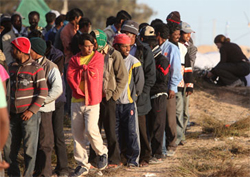After a field visit to Libyan eastern governorates, WHO official stresses that humanitarian efforts are a priority and warns that food and medicine stocks are insufficient for more than a few weeks
 Dr Naeema Al-Gasseer, Assistant Regional Director for the WHO Regional Office for the Eastern Mediterranean , warned that the medicine and food stocks available in the Libyan Arab Jamihirya are insufficient to cover more than a few weeks, and that concerned parties should act fast to ensure smooth provision of humanitarian assistance to avoid the consequence of lack of crucial items.
Dr Naeema Al-Gasseer, Assistant Regional Director for the WHO Regional Office for the Eastern Mediterranean , warned that the medicine and food stocks available in the Libyan Arab Jamihirya are insufficient to cover more than a few weeks, and that concerned parties should act fast to ensure smooth provision of humanitarian assistance to avoid the consequence of lack of crucial items.
Dr Naeema Al-Gasseer, Assistant Regional Director for the WHO Regional Office for the Eastern Mediterranean , warned that the medicine and food stocks available in the Libyan Arab Jamihirya are insufficient to cover more than a few weeks, and that concerned parties should act fast to ensure smooth provision of humanitarian assistance to avoid the consequence of lack of crucial items. This was announced at the end of a field visit paid by Dr Al-Gasseer as part of a United Nations mission to the Libyan eastern governorates including Benghazi, Al Marj, Al Bayda, Sousa, Darnah and Tobruk, in the context of WHO’s efforts to support health in all Member States.
WHO, in collaboration with the Libyan authorities, is directing available support towards ensuring the provision of medicines and surgical commodities, in addition to ensuring the availability of medical staff, through humanitarian partners, to support the medical teams currently working in Libya, especially nurses. Recently 10 surgical kits crossed the Egyptian/Libyan borders into Libya. The kits, funded by the Government of Norway, are sufficient to cover 10 000 persons for 10 days.
Based on direct observation of the flow of medical supplies, initiated by WHO on 17 February, the Regional Office renews its appeal to increase humanitarian aid to the Libyan people, to immediately halt armed operations against civilians, and to stop the increasing bloodshed that has claimed more than 2000 lives so far and many more injuries, according to the available estimates.
WHO, through the Assistant Regional Director, expresses deep concerns over the lack of psychological care and support, lack of sufficient medicines and specialists in this field, and stresses the importance of giving this issue the necessary interest and care. WHO is also concerned about the deterioration of services provided to people with special needs in Libya, a matter that must be addresses immediately. WHO is working closely with concerned partners to meet these needs as much as possible.



